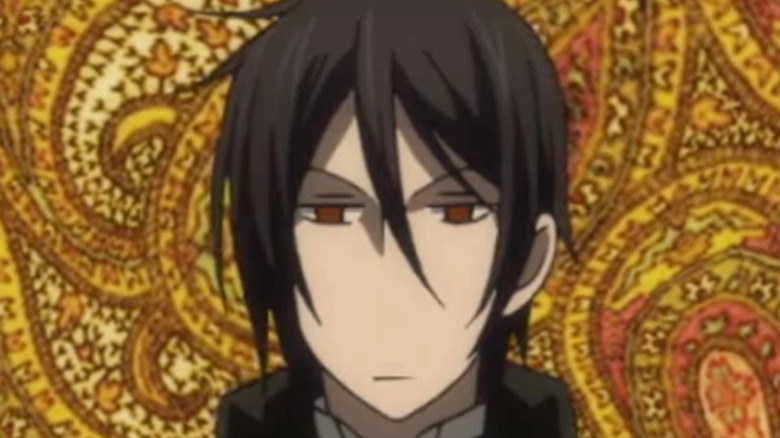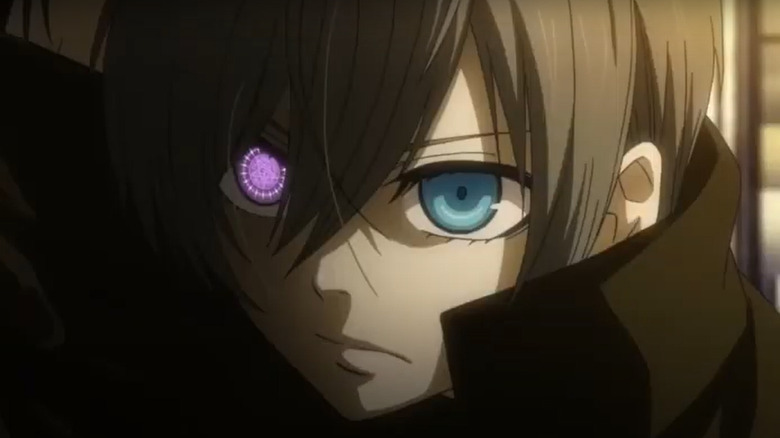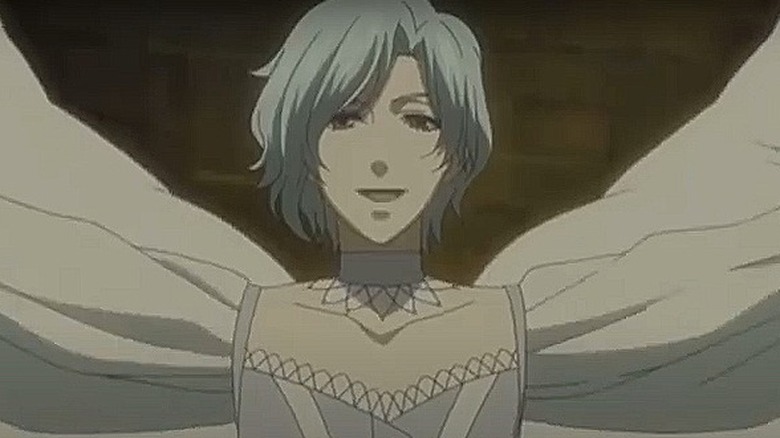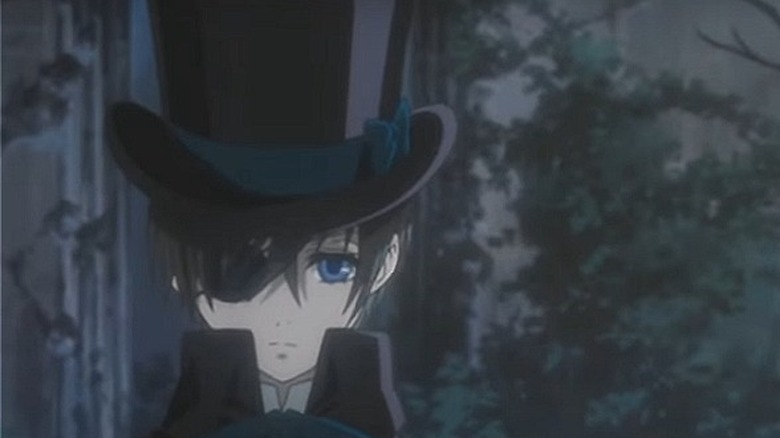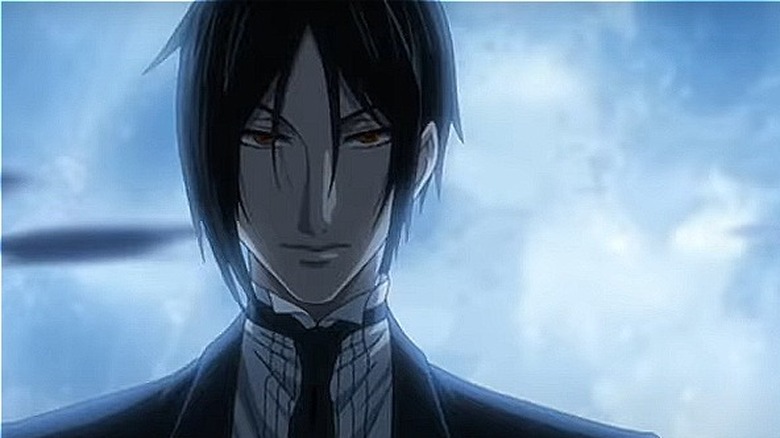The Ending Of Black Butler Season 1 Explained
"Black Butler" is an anime based on a manga of the same name, both of which follow Ciel Phantomhive, an orphan boy who, in one fell stroke, lost his parents to a terrible tragedy and inherited a vast empire ... and no, there are no Batman costumes, so don't ask. In the wake of this horror (and many more, but that's for later), the 10-year-old Ciel makes a binding contract with the demon named Sebastian Michaelis who agrees to assist the young heir in his quest for revenge, in exchange for his immortal soul.
In terms of anime, "Black Butler" is relatively straightforward. That being said, the series –- which strays a fair way from the source material –- is still packed with a massive ensemble cast and enough grotesque visuals to distract even the sturdiest mind. With that understood, herein lies a breakdown of the first season's story and an analysis of where it leaves off.
The Phantomhive tragedy shaped everything
The tragedy that orphaned Ciel Phantomhive shaped everything that happened thereafter, so it's important to understand what occurred. Earl Vincent and Countess Rachel Phantomhive, Ciel's parents, met a gruesome end when their manor burned to the ground atop their unfortunate heads. The event was no accident, either, it was a planned assault against the Phantomhive family. Ciel's survival was a happy accident, although his luck was short-lived. In the wake of the wreckage and smoke, Ciel was abducted and viciously tortured (amongst other things that aren't fit to mention here). His abductors attempted to summon a demon, but the demon, Sebastian Michaelis, chose to make his Faustian contract with their prisoner, instead. The abductors did not make it out alive.
What came next covers the bulk of the first season. Ciel and Sebastian are a powerful duo, with Ciel helming the family company, Funtom — a toy factory, by day — and working for Queen Victoria (yes, THE Queen Victoria, because "Black Butler" takes place during the Victorian Era of London) by night, investigating mysterious and otherwise unexplainable crimes, while Sebastian poses as his highly efficient butler. Ciel's staff, Baldroy the cook, Finnian the gardener, and Mey-Rin the maid, often join their young lord for his quests in the name of the crown, serving the dual purpose of humanizing the emotionally distant boy. The company faces criminals like Jack the Ripper and more malevolent forces, like zealous angels.
After all, no story about demons is complete without a few angels in the mix, and these angels are at the heart of Ciel's true quest: revenge for his fallen family.
Angela Blanc and Ashe Landers prove that angels aren't always better than demons
In the world of "Black Butler" (and in fairness, in most popular media, such as "Good Omens"), angels are neither benevolent nor merciful, at least not in a way that holds meaning for humanity. Angels, rather, are zealous messengers for a dogmatic creator and consider the average soul to carry little to no significance outside of their purposes in regard to the ineffable plan (cheers for a cross biblical media reference). Angela Blanc and Ashe Landers are two recurring characters in the first season that prove to be one and the same entity, a bigender angel whose mission is to erase the Phantomhive family's darkness from the face of the earth. Aside from their heavenly connections, their power reaches all the way up to Queen Victoria, who is revealed to be, essentially, their puppet.
Ultimately, Sebastian Michaelis slays the angel, with a fencing foil of all tools, before their holy will can lay waste to Ciel Phantomhive. It's interesting to note how the angel is portrayed as being manic in all things. In opposition, Sebastian, a literal demon, is portrayed as calm and collected. Yes, Sebastian's continued cooperation with Ciel hinges on the promise of devouring the boy's soul, but he's politely surgical with his violence, as where the angel smites with all the refined grace of a nuclear explosion. This is actually a common theme in anime, which often promotes morally gray and deeply flawed characters. It's better, then, to say that "Black Butler" has protagonists instead of heroes, an important difference to make.
After all, there's really no universe in which Ciel could be considered a pure force for good.
Ciel Phantomhive struggles to balance kindness and coldhearted murder
So, Ciel Phantomhive is something of a troubled youth, but that's never seemed to stop him. In fact, Ciel's struggles have only ever fueled his ambition. Within three years of his parent's double murder (courtesy of Angela), he helmed the complete recreation of the Phantomhive estate. He also made a name for himself, not only as a businessman but as an investigator, as well. While it's clear that Ciel investigates the dark underside of humanity to find his parents' killer, there's no question that his actions also save a number of innocent lives. He's also surprisingly progressive for a thirteen-year-old boy in the Victorian Era, actively protecting sex workers from Jack the Ripper (who is actually his aunt, but that's both complicated and currently irrelevant).
And — despite his dark past, despite his constant orders for Sebastian to kill criminals, despite the looming threat of his soul being literally consumed by a demon — he's still a boy, and he still has a heart. Frequently, Ciel postpones his own ambitions to assist those in need, so much so that Sebastian begins to question his dedication to the revenge which predicated their contract. In the final moments of the season, after the mysteries are solved and the "villains" are defeated, Ciel willingly offers his soul to Sebastian, demanding that the demon make the process as painful as possible to prove that he was human all along.
The kid has guts, something that the cunning demon Sebastian always admires ... and something that makes his soul all the sweeter, and worth the wait.
Sebastian Michaelis goes through hell on earth for a good meal
It's not entirely clear as to whether Ciel Phantomhive or Sebastian Michaelis is the true protagonist of the series. Ciel certainly calls the shots but Sebastian is undeniably viewed as the primary pull for fans: just watch the intro sequence, and that will be apparent enough. There's also the little matter that both the anime and the manga are named after him. Sebastian is the force behind the throne of the remaining Phantomhive family, following Ciel's order's carte blanche, provided that they don't oppose the purpose of the two's contract. It's a little like "Twilight" in that he finds the young lord disturbingly delicious, but it's also –- thankfully –- unlike "Twilight" in literally every other possible facet. He operates as a bodyguard, a chef, an investigator, anything and everything required of him, all because he believes Ciel's soul to be a meal worth the wait.
Serving Ciel, however, is not an easy task. The boy insists on saving innocent lives wherever he can, which makes Sebastian's mission far more tedious. To be fair, it's suggested that the demon finds these heroic notions mostly amusing. He seems to enjoy lightly teasing Ciel about how ready he is to eat his soul, banter which is arguably not ideal for the kid's mental health. In the final moments, after he annihilates the angel, it appears as if Sebastian really does follow through and eat Ciel's soul.
Clever observers will note that there is a second season, which stars the duo with business as usual, so, no, Sebastian doesn't actually succeed at this. He tries, though — but something comes up. Another plot, another demon. But that's the stuff that second seasons are made for.
